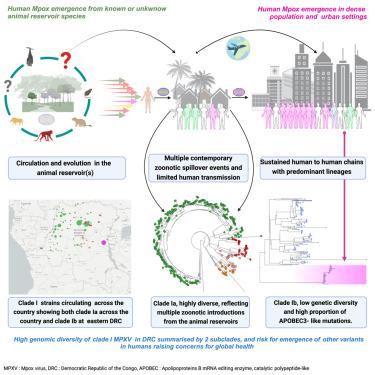Clade I mpox virus genomic diversity in the Democratic Republic of the Congo, 2018–2024: Predominance of zoonotic transmission
IF 45.5
1区 生物学
Q1 BIOCHEMISTRY & MOLECULAR BIOLOGY
引用次数: 0
Abstract
Recent reports raise concerns on the changing epidemiology of mpox in the Democratic Republic of the Congo (DRC). High-quality genomes were generated for 337 patients from 14/26 provinces to document whether the increase in number of cases is due to zoonotic spillover events or viral evolution, with enrichment of APOBEC3 mutations linked to human adaptation. Our study highlights two patterns of transmission contributing to the source of human cases. All new sequences from the eastern South Kivu province (n = 17; 4.8%) corresponded to the recently described clade Ib, associated with sexual contact and sustained human-to-human transmission. By contrast, all other genomes are clade Ia, which exhibits high genetic diversity with low numbers of APOBEC3 mutations compared with clade Ib, suggesting multiple zoonotic introductions. The presence of multiple clade I variants in urban areas highlights the need for coordinated international response efforts and more studies on the transmission and the reservoir of mpox.

2018-2024 年刚果民主共和国 I 支 mpox 病毒基因组多样性:人畜共患病传播占主导地位
最近的报道引起了人们对刚果民主共和国(DRC)麻风腮流行病学变化的关注。我们为来自14/26个省的337名患者生成了高质量的基因组,以记录病例数的增加是由于人畜共患病的蔓延还是病毒的进化,其中APOBEC3突变的富集与人类的适应有关。我们的研究强调了导致人类病例来源的两种传播模式。来自南基伍省东部的所有新序列(n = 17;4.8%)都与最近描述的支系 Ib 相符,这与性接触和持续的人际传播有关。与此相反,所有其他基因组都属于Ia支系,与Ib支系相比,Ia支系表现出较高的遗传多样性,但APOBEC3变异的数量较少,这表明存在多次人畜共患病的传入。在城市地区出现多个 I 支系变异体突出表明,需要协调国际应对努力,并对 mpox 的传播和储存库进行更多研究。
本文章由计算机程序翻译,如有差异,请以英文原文为准。
求助全文
约1分钟内获得全文
求助全文
来源期刊

Cell
生物-生化与分子生物学
CiteScore
110.00
自引率
0.80%
发文量
396
审稿时长
2 months
期刊介绍:
Cells is an international, peer-reviewed, open access journal that focuses on cell biology, molecular biology, and biophysics. It is affiliated with several societies, including the Spanish Society for Biochemistry and Molecular Biology (SEBBM), Nordic Autophagy Society (NAS), Spanish Society of Hematology and Hemotherapy (SEHH), and Society for Regenerative Medicine (Russian Federation) (RPO).
The journal publishes research findings of significant importance in various areas of experimental biology, such as cell biology, molecular biology, neuroscience, immunology, virology, microbiology, cancer, human genetics, systems biology, signaling, and disease mechanisms and therapeutics. The primary criterion for considering papers is whether the results contribute to significant conceptual advances or raise thought-provoking questions and hypotheses related to interesting and important biological inquiries.
In addition to primary research articles presented in four formats, Cells also features review and opinion articles in its "leading edge" section, discussing recent research advancements and topics of interest to its wide readership.
 求助内容:
求助内容: 应助结果提醒方式:
应助结果提醒方式:


